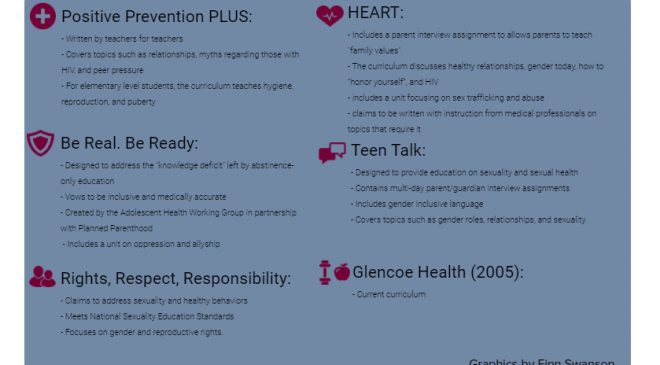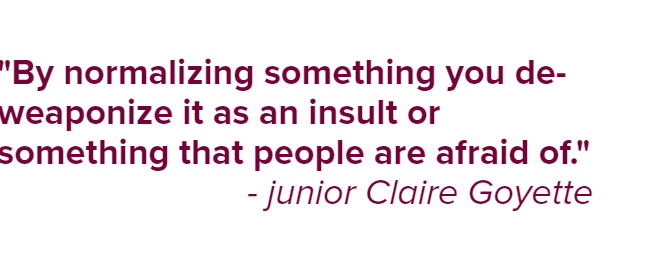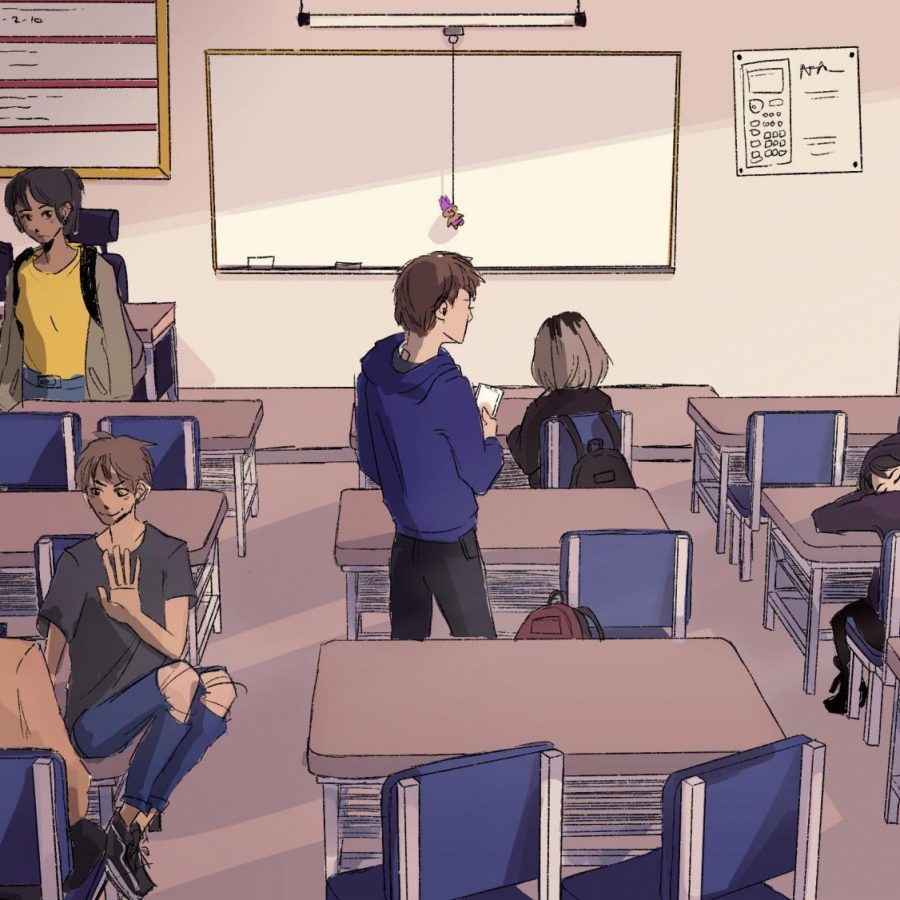Inclusive Education
Throughout the district, community members express their thoughts on how to address updating the health curriculum and making it more inclusive.
Feb 3, 2021
Decisions at the Board
For the past few years, Conejo Valley Unified School District has been evaluating several health curriculums in order to become compliant with the California Healthy Youth Act. As they move towards a decision many members of the community from students to staff are voicing their opinions.
The California Healthy Youth Act (AB-329) was a law that took effect in Jan. 2016 which required seventh through twelfth grade to include comprehensive sex education, as well as education on sexual orientation, gender, body image, relationships, marriage and family. Within the comprehensive sex education subsect, students will learn about abstinence from sexual activity as well as drug-use; however, abstinence-only education is not permitted. This section will also encompass fact-based education on sexuality and human development at the appropriate grade levels.
Similar to the current framework, parents have the choice to opt-in or out their students of certain units pertaining to HIV prevention and sexual health, which also includes LGBT+ related content. However, this does not apply to references of gender identity or sexual orientation in courses outside of health. For example, if a history class references the legalization of gay marriage, parents aren’t allowed to opt-out their child from this unit. It should also be noted that according to ACLU, “schools must integrate LGBTQ people throughout the curriculum and may not isolate this content to particular lessons”.
Conejo Valley Unified School District decided to delay any changes to the health curriculum until the California School Board adopted a framework and the California Dept. of Education published the approved document.
“Our district had been waiting to see what the actual guidance was before we jumped right in and either created something or adopted something that was on their list,” CVUSD board trustee Cindy Goldberg said.
The school board is deciding what to do regarding the California Healthy Youth Act as so far they have not been in compliance. They have reviewed multiple curriculum options including “Be Real, Be Ready,”, “Teen Talk”, “HEART”, “Positive Prevention PLUS” and “Rights, Respect, Responsibility”.
“I’d like to see what the students have to say [and] what the teachers have to say when they [pilot curriculums], and what seems to make most sense for our community,” Goldberg said.

- Written by teachers for teachers
- Covers topics such as relationships, myths regarding those with HIV, and peer pressure
- For elementary level students, the curriculum teaches hygiene, reproduction, and puberty
- Designed to address the harm done by abstinence-only education
- Vows to be inclusive and medically accurate
- Created by the Adolescent Health Working Group in partnership with Planned Parenthood
- Includes a unit on oppression and allyship
Rights, Respect, Responsibility:
- Claims to address sexuality and healthy behaviors
- Meets National Sexuality Education Standards
- Focuses on gender and reproductive rights.
- Includes a parent interview assignment to allows parents to teach
- The curriculum discusses healthy relationships, gender today, how to “honor yourself”, and HIV.
- There is also a unit focusing on sex trafficking and abuse
- They claim to be written with instruction from medical professionals on topics that require it
- Designed to provide education on sexuality and sexual health
- Contains multi-day parent/guardian interview assignments
- Includes gender-inclusive language
- Covers topics such as gender roles, relationships, and sexuality
Glencoe Health (2005):
- Current curriculum
At the board meetings on Dec. 1 and Dec. 15, multiple people called in support or opposition to updating the health curriculum, with many focused on the “HEART” curriculum.
“‘HEART’ is a funhouse mirror reflection of curriculum that would be useful to students in any way. It focuses on moralizing, fear-mongering and backward social ideas rather than on science and the reality of teenage and adult life,” founder of Indivisibility Conejo Jon Cummings said.
Other community members expressed their support for this curriculum, as they claim it allows parents to control the extent of their child’s health education and is the only one that allows them their religious freedom. Some callers also claim the other curriculums, or sometimes the board as a whole, are pushing for students to have sex or to be LGBT+, although the Healthy Youth Act only instructs teaching students how to “protect their sexual and reproductive health” and “[providing] pupils with the knowledge and skills they need to develop healthy attitudes concerning” sexual orientation and gender.
“Parents, watch out,” one caller said, “X-rated teachings of every sex position imaginable, including how to do each one.”
However, no curriculum available to the district includes information on these specifics of sexual intercourse.
“There’s been a lot of misinformation that people try to put forth about what we will and will not be teaching in our classrooms… there’s nothing being snuck in,” Goldberg said.
One caller shared her experiences with a lack of comprehensive health education and her opinion on an updated curriculum.
“As a childhood sexual assault survivor, my time in health class was miserable. The language used in our current curriculum silences survivors by degrading those who have had sexual experiences regardless of circumstance as having no respect for themselves,” said the anonymous caller, “if we did have comprehensive sex education regarding consent, perhaps my choices over my body would have been respected when I was three years old.”
Another student caller also mentioned consent as an important topic, noting how the lack of education on what consent truly is may cause confusion for sexual assault survivors.
“Some students do not know that they have experienced sexual assault,” the caller said.
The student goes on to state consent is not a grey topic and should be taught to all students. Students are required to learn about “affirmative consent” in order to graduate, according to the California Healthy Youth Act, but this rule does not apply to districts that don’t include health education as a graduation requirement already.
While the “HEART” curriculum caused immense controversy during board meetings, it is no longer being considered and neither is “Be Real. Be Ready”.
Many board members expressed how important community voices are when deciding on a curriculum.
“What I took away from all of the discussions [was that] the educators, the district leadership, the board and the community, and especially I think, the students, [were] voicing the urgency of updating our comprehensive sexual health curriculum,” school board trustee Lauren Gill said.
The Healthy Youth Act is also known for its recognition and inclusion of LGBT+ topics. As stated in the FAQ, because the Healthy Youth Act requires that pupils must be provided with the necessary information and skills to healthfully navigate growth, development, identity, and relationships, sexual health education must be applicable for students of all genders and sexual orientations to meet these standards.
This instruction isn’t just related to sex but to students, identity and existence as a whole, instructing “[teaching] students about gender, gender expression, gender identity, and [to] explore the harm of negative gender stereotypes[, which] means that schools must teach about all sexual orientations and what being LGBTQ means”. While some callers oppose this many also expressed support.

Students for Change
A group known as Unity Conejo was started in part to push for a more inclusive health curriculum. The founder of the organization, Megan Goebel, says her daughter coming out as transgender was what made her realize the lack of LGBT+ education and training in the district.
“It was kind of like that Pandora’s box or domino effect where it started. And then it just kept going. And I started finding all these different inequities and all these different problems,” Goebel said.
Another goal of the organization is to dispel the myths surrounding inclusive education, especially those surrounding including gender education in elementary school.
“I think the biggest myth is also the biggest misunderstanding. It’s that sex and gender are not mutually exclusive,” Goebel said, “So, you know if you’re trying to teach about gender and about gender binaries, and why it’s so important to support kiddos that are either gender non conforming or transgender…it’s not about sex. Right? It’s about gender.”
One of Unity Conejo’s subcommittees is the student subcommittee, which is for LGBT+ and ally students across the district to help work towards a more accepting environment for LGBT+ youth. Multiple members have called into school board meetings during public comments to share their experiences and urge for an updated, inclusive curriculum.
Ally and member of the organization, Newbury Park High School junior Ava Ahlberg explains she supports including LGBT+ students in education because she wishes to help them have better experiences across the district.
“I can’t speak for [all] LGBTQ+ people, but I know that a lot of them would have an easier experience finding out who they are…” Ahlberg said.
The main reason driving this organization is that this inclusion would create an environment where LGBT+ students can feel accepted and be better understood by their peers, which many may find important as LGBT+ youth have higher suicide and depression rates and about half feel unsafe and school and experience discrimination there.
Junior at Newbury Park High School and Unity Conejo member Michael Lindroth comments that better information and experiences would have helped him more easily come to terms with his identity.
“I would say that if there had been more education [and representation] I would have felt far more comfortable with myself and my own sexuality and it would have definitely caused a lot less trauma and struggle that I had experienced growing up,” said Lindroth.
Similarly, another member, junior Claire Goyette, welcomes the normalization of LGBT+ identities that would come with an updated curriculum.
“By normalizing something you de-weaponize it as an insult or something that people are afraid of,” Goyette said.
From the District
The Lancer values the opinions and comments of members of CVUSD. These are the voices of parents, school board members and students in the Conejo Valley Unified School District.
“I particularly heard students speaking out about the deficiencies of the curriculum as they had experienced it thus far…so I heard loud and clear that what we have currently is not adequate, and that we need to rectify the situation as quickly as possible.” – CVUSD school board trustee Lauren Gill
“[I asked] my kiddo. This isn’t happening? You don’t get any of this information? She’s like, ‘yeah’.” – CVUSD parent Beth Neal
“I feel that for many people [LGBT+ education] is something that they might be uncomfortable with [and] gradually adding it in… would be the best way to include it into schools…[though] I myself am totally fine with it.” – sophomore Carter Supple
“[Without proper education] students [are] left to their own devices, and they’re literally left to their own devices. And they’re going to find really bad scary information before they get the real information.” – CVUSD school board trustee Cindy Goldberg
“My son, when he was in first grade, some kids pushed him down and pulled off his pink shoes and ran away with them telling him that pink is for girls and he’s not allowed to wear those…[It helps a lot] teaching kids that just because you are a boy or a girl, or neither, doesn’t mean you have to act or look a certain way.” – CVUSD parent Rachael Jordan



